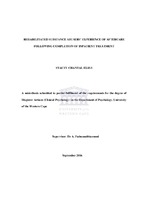| dc.description.abstract | Substance abuse is a public health concern in South Africa, and Western Cape Province in particular has been identified as having alarming rates of substance abuse. Substance abuse is the cause of some of the most pervasive and costly problems in society. Substance abuse is associated with various social problems such as crime, violence, unemployment, poverty, risky sexual behaviours, the escalation of chronic diseases such as AIDS and TB, and dysfunctional family life – and these problems are often interlinked. Furthermore, substance disorders place a huge strain on the health and welfare system of South Africa. In- and outpatient treatment facilities exist in communities to assist with alleviating the problem of substance abuse. Aftercare facilities are a form of outpatient service for substance abusers who have completed inpatient treatment. The primary aim of aftercare is to assist recovered substance abusers to maintain treatment gains by abstaining from substance use and to facilitate their reintegration with their families and communities. The purpose of the present study was to explore and obtain an in-depth understanding of the experiences of rehabilitated substance abusers in aftercare, following their completion of inpatient treatment. The sampling method for the study was purposive, and the sample consisted of two female and six male participants. Participants' attendance at the aftercare programme was verified with the aftercare coordinator. Semi-structured interviews were conducted and data were analysed using interpretative phenomenological analysis. Results of the study found that, overall, participants had a positive experience of aftercare. Furthermore, results indicated that aftercare played a vital role in assisting participants to maintain treatment gains. | en_US |

